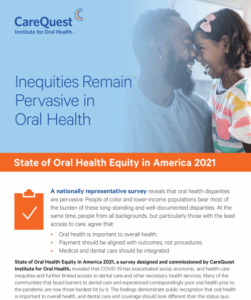The COVID-19 pandemic exacerbated inequities in the United States and further limited access to dental care among already disadvantaged groups. But there is hope on the horizon. Increasingly, the American public is recognizing the importance of oral health and believes our oral health system needs to change.
A new visual report from CareQuest Institute for Oral Health about pervasive inequities in oral health highlights findings from a recent survey of 5,320 adults. Most notably:
- 57% of Black adults have lost one or more permanent teeth due to decay or gum disease compared to 46% of all American adults.
- Black respondents (40%) were 2x more likely to respond that oral health is more important than physical health compared to white respondents (20%).
- 95% of all respondents know that there is a connection between the health of the mouth and the health of the rest of the body.
- 87% of respondents support the alignment of payment with prevention and management of disease, key elements in value-based care.
The visual report, drawn from findings from the State of Oral Health Equity in America 2021, also highlights disparities between different groups in terms of the prevalence of different oral health problems and attitudes toward value-based payment within different income levels.
You may also be interested in:
- A suite of resources — including visual reports and research reports — developed from findings from a nationally representative survey of consumer and patient attitudes, experiences, and behaviors on oral health.
- Consumer Perspectives on Oral Health Access, Outcomes, and Quality of Care, a recent webinar featuring a panel of experts who discuss the disparities in dental insurance coverage and access to care, and explore findings on the effects of the social determinants of health.
- More on how CareQuest Institute is focusing on health equity.

